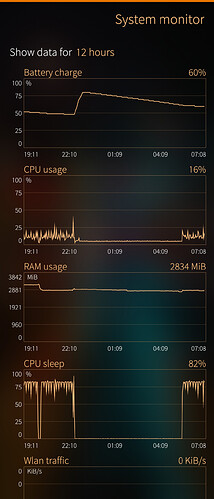So, this has happened a few times now, and happened again last night:
I plugged my phone (Xperia 10 III) to charger at 22.10 o’clock, and i unplugged it circa 30 minutes later before i went to bed. I woke up and set off the alarm at 6.30.
Normally the battery consume is approx 1% per hour when idling (mobile data on, WiFi off), but now it had went down 18% (so double the normal amount, and then some).
System Monitor showed the CPU sleep was disabled when connecting to charger, and it went back on when i woke up.
The charger is Sony’s USB-PD fast charger (XQZ-UC1), and i use Battery Buddy to limit the charge to 80%.
Any ideas?
